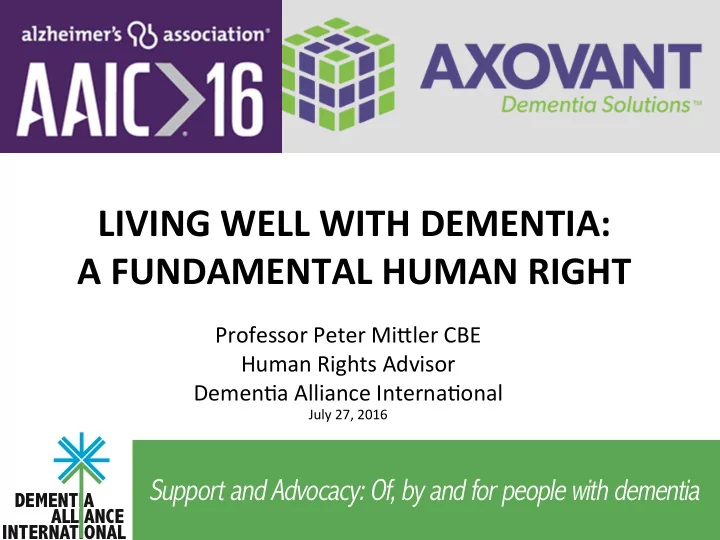

LIVING WELL WITH DEMENTIA: A FUNDAMENTAL HUMAN RIGHT Professor Peter Mi+ler CBE Human Rights Advisor Demen<a Alliance Interna<onal July 27, 2016
“Demen6a receives the worst care in the developed world” Organisa6on for Economic Coopera6on and Development (2015)
HOLDING GOVERNMENTS TO ACCOUNT • ASK US • What Ma+ers to Us • What changes do we want to see? • LISTEN TO US • WORK IN PARTERNSHIP WITH US • WE ARE EXPERTS BY EXPERIENCE
NOTHING ABOUT US WITHOUT US
IN 2015, DAI’s CHAIR KATE SWAFFER DEMANDED: • Policy and prac6ce should be based on UN Conven6on on the Rights of Persons with Disabili6es • That research should focus as much on care and support as on cure • A more ethical pathway of care, including pre and post-diagnos6c support from a wide range of professionals in the community
ADI Global Demen6a Charter “I CAN LIVE WELL WITH DEMENTIA” I SHOULD HAVE: ACESS TO A DOCTOR to check if I have demen6a (25) • medicine and treatment that helps me (25,26) • high quality care that’s right for me (9, 25,26) A SAY in the care and support I am given (21,25,26) HELPED TO LIVE INDEPENDENTLY for as long as I can (19) TREATED AS AN INDIVIDUAL: those looking a^er me knowing me RESPECTED for Who I Am (3a,d) MY END OF LIFE WISHES discussed with me while I can do so
Towards a Rehabilita6on Pathway: A THOUGHT EXPERIMENT • You have sustained a severe brain injury as a result of – stroke, road traffic accident, penetra6ng bullet wound, etc. • What services and supports would you expect to receive – in hospital – prior to discharge – at home?
Rehabilita6on Team • Specialist in rehab medicine • Physiotherapist –restore mobility, balance • Speech and language –communica6on, swallowing • Clinical psychologist – cogni6ve func6oning • Social worker- plan transi6on to home • KEY WORKER appointed at 6me of diagnosis • Occupa6onal therapist- adapta6ons to home, PC • Other specialists from all relevant agencies
PEOPLE WITH DEMENTIA ARE INCLUDED IN CRPD DEFINITION BUT NOT IN ITS IMPLEMENTATION • ‘Persons with disabili?es include those who have long-term physical, mental, intellectual or sensory impairments • which in interac?on with various barriers • may hinder their full and effec?ve par?cipa?on in society on an equal basis with others.’ (Ar?cle 1).
USING CRPD TO PROMOTE THE RIGHTS OF PEOPLE WITH DEMENTIA GENERAL PRINCIPLES • Respect for dignity, autonomy, freedom to make choices, independence • Non-discrimina<on e.g. age, gender, race, disability • Full par<cipa<on and inclusion in civil society • Respect for difference; acceptance of disability as part of human diversity • Equal opportunity • Accessibility • Equality between women and men
CRPD ARTICLES • Right to Life • Accessibility at all levels • Equal Recogni<on Before the Law • Freedom from torture, cruel, inhuman or degrading treatment, exploita<on, violence and abuse • Living independently and par<cipa<on on in the community; • Respect for home and family • Health • Rehabilita<on • Employment • Adequate standard of living and social protec<on • Par<cipa<on on in poli<cal and public life, cultural life, recrea<on, leisure and sport
HOW CAN THE CONVENTION BE USED BY ALZHEIMER ASSOCIATIONS AND SELF-ADVOCACY GROUPS? Lobbying to ensure that regional, na6onal and local demen6a policies and future plans reflect CRPD Principles and Ar6cles Insis6ng on the right of people with demen6a to par6cipate as equals in the development of policy and in the implementa6on of the CRPD (Art. 33.3) Using their right to submit parallel reports when their country is repor6ng to the CRPD Commiiee Publicising the Commiiee’s Concluding Observa6ons to advocate for the implementa6on of its Recommenda6ons.
TWO PLANETS PLANET DISABILITY PLANET DEMENTIA
“ The UN Disability Conven<on is a mirror to society. It makes us face up to our own values and it forces us to acknowledge the large gap that s<ll exists between the ‘myth system’ of our own values… and the ‘opera<ons system’ of how these values are dishonoured in daily prac<ce. Thus the Treaty is a force for ra<onality as well as a vehicle for carrying these values squarely to the heart of the disabili<es field. As with all mirrors, we can refuse to look into them; we can look at them but ignore their reflec<on or we can take no<ce of our reflec<on and commit to a process of change”. (Gerard Quinn 2009)
NEXT STEPS • ADI-DAI will meet the CRPD Commi+ee in August • Support AS socie<es in developing HR policies & • submihng parallel reports to UN • DAI will promote human rights approach at next regional conferences- Europe & Asia Pacific • Raise our concerns about human rights of persons with demen<a in WHO Disability Policy, CBR and regional and na<onal demen<a strategies.
THANK YOU
Recommend
More recommend